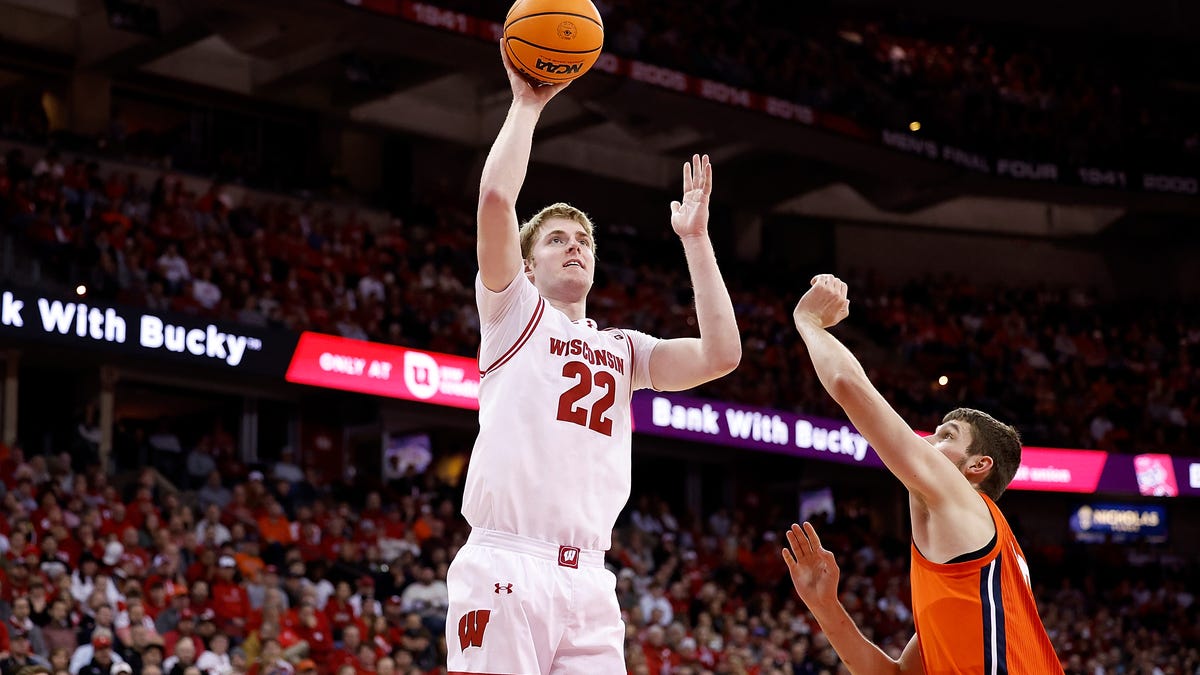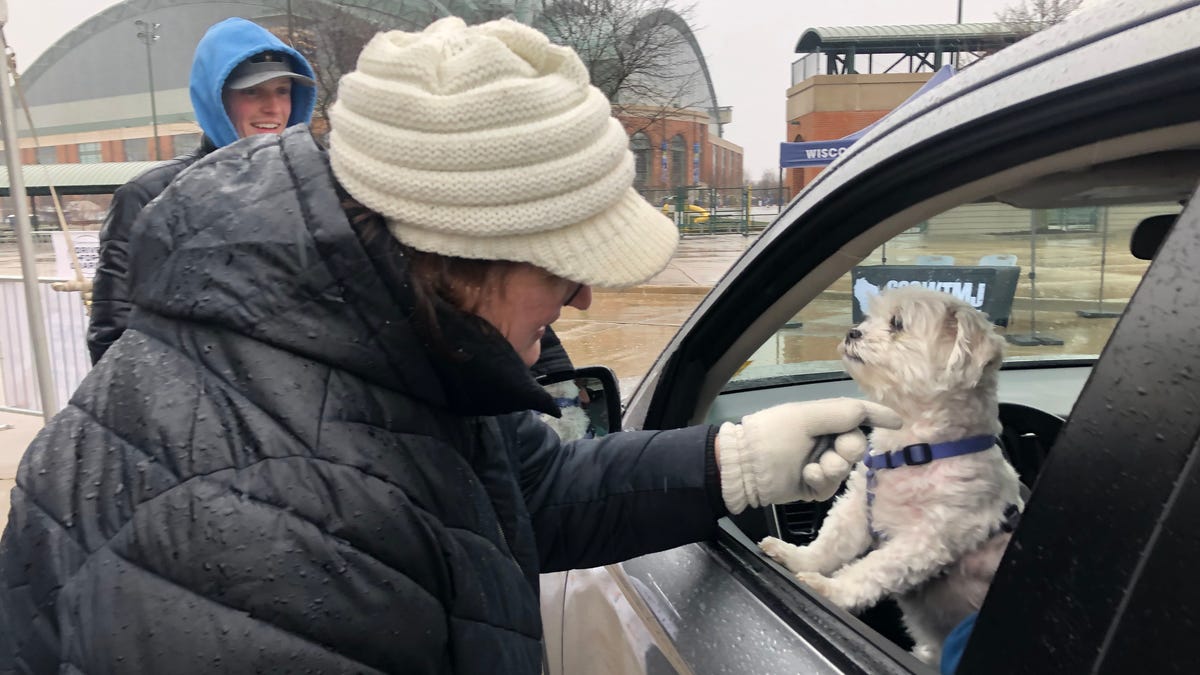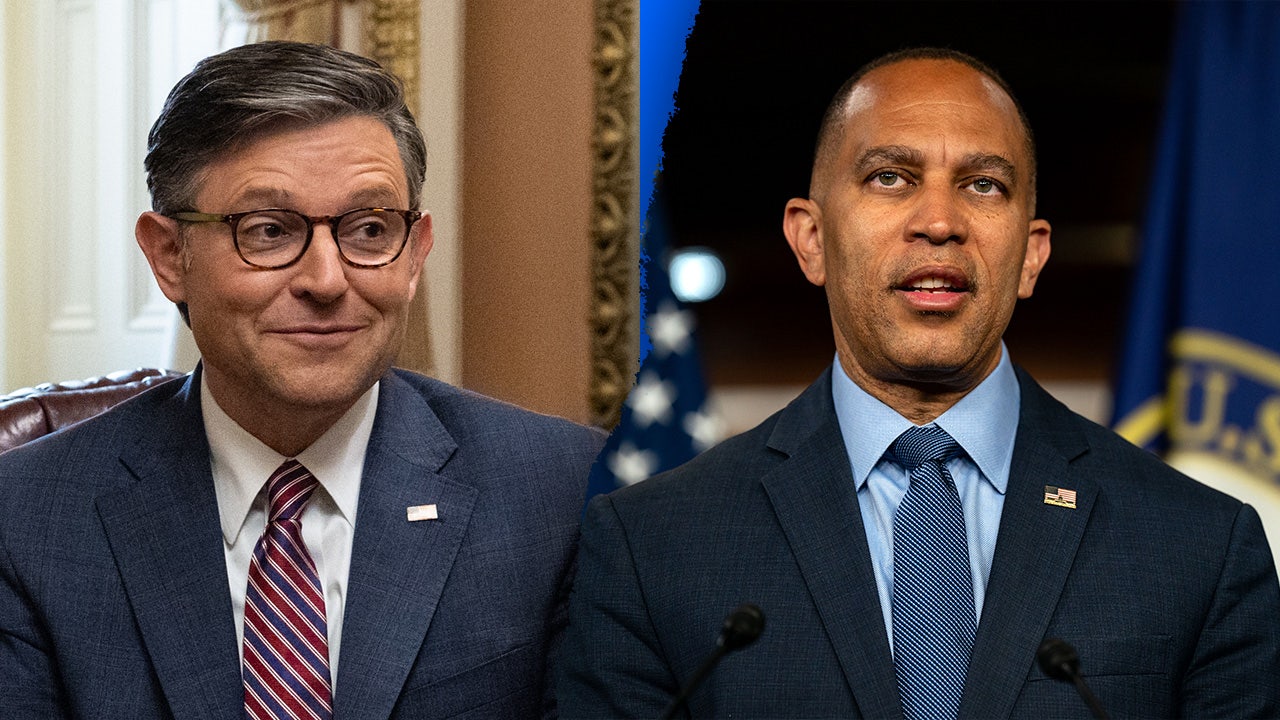Wisconsin
Wisconsin native Joe Thomas finally gets biggest victory, enshrinement into Hall of Fame
/cloudfront-us-east-1.images.arcpublishing.com/gray/XU3AAXPND5FJZIHAOMBY3AANXA.JPG)
CANTON, Ohio (AP) — Joe Thomas got a victory bigger than anything possible on the field.
Cleveland’s reliable left tackle, who never made the playoffs and endured so much losing, misery and turnover while playing 10,363 consecutive snaps over more than a decade with the Browns, was inducted Saturday into the Pro Football Hall of Fame.
His personal Super Bowl.
Cheered by a large contingent of barking Browns fans, Thomas, elected in his first year of eligibility, was presented by his wife, Annie, and their four children before delivering remarks that touched on family and his Midwest football journey.
After unveiling his bronze bust on the stage inside Tom Benson Stadium, Thomas wrestled with emotions during a 20-minute speech that included some self-deprecating humor and playful jabs at his time suiting up for bad Browns teams.
Cleveland went 48-119 in his 167 games, and Thomas’ .287 winning percentage is the worst of any of the Hall’s 369 inductees.
Proudly wearing the new gold jacket presented to him on Friday night by Steelers Hall of Fame running back Jerome Bettis, Thomas thanked the six Browns coaches he played under for lessons “I’ll take with me for the rest of my life.”
He then addressed Cleveland’s absurd revolving door of quarterbacks during his tenure.
“To my quarterbacks, all 20 of them,” Thomas said, who made 10 straight Pro Bowls and was a six-time All-Pro. “Yes, I blocked for more different starting quarterbacks than any player in NFL history. What an honor.”
The enshrinement weekend also served as a Cleveland reunion as dozens of Thomas’s former teammates — many of them fellow offensive linemen — that returned to Northeast Ohio to celebrate and party with him.
“Thank you for always showing up for me,” he told his teammates in the audience. “Thank you for giving me the ability to always count on you guys. If you notice, I didn’t mention any of my backup left tackles. I’m sorry about that. I never gave you an opportunity to go on the field and show what you could do, but I did make you take all my practice reps.”
One of his closest teammates, current Browns All-Pro left guard Joel Bitonio, who lined up on the right side of Thomas for four seasons, arrived after practicing an hour away in Berea, Ohio, earlier in the day.
Even in the lean seasons, and there were many in Cleveland, former Browns punter Dave Zastudil said Thomas never wavered.
“He always brought some kind of humor to the locker room, even on days that maybe the team was down,” Zastudil said. “You always looked at Joe, he was smiling, always cracked jokes. But what I liked about Joe was whether it was the guy making eggs, the guy cleaning up the field afterwards, he always treated everybody the exact same.
“Football never got to his head, he was always the most humble successful person I think I’ve ever met.”
Thomas attributed his humility and more to his parents, Eric and Sally.
While pointing out his consecutive play streak, which ended when he tore a triceps during Cleveland’s 0-16 season in 2017, Thomas thanked his dad for showing him the value of hard work and loyalty.
“I remember you strapping cross country skis on your feet and going to work in a blizzard in Milwaukee, Wisconsin,” Thomas said to his father, who sat at a table in front of the stage with his wife and grandchildren. “Because, you know what? The calendar says it’s a workday and we got work to do.
“At the time, I didn’t really know what the quote ‘availability is the most important ability’ meant, but that’s exactly what it meant to you and those were the values that I learned from you, buddy.”
Thomas would receive the same loyalty for Browns fans, who remained faithful to the team despite double-digit loss seasons.
“Even if we were losing, you guys were there on Sundays barking in the Dawg Pound and partying in the Muni Lot,” he said. “You guys are the heartbeat of the Cleveland Browns, and it was truly my honor to be able to represent you on and off the field for 11 seasons.”
During her introductory video, Annie Thomas focused on her husband’s steadiness.
“He’s the one you can rely on,” she said. “His legacy is he is consistent. You can count on him no matter what. If you need him, he will be there and he will be perfect.”
Thomas was exactly that for the Browns.
Copyright 2023 The Associated Press. All rights reserved.

Wisconsin
Former Wisconsin basketball center adds to his list of NBA workouts

Former Wisconsin Badgers center Steven Crowl is compiling a long list of NBA workouts.
Crowl, whose Badgers tenure concluded with an NCAA Tournament Round of 32 loss to BYU in late March, has reportedly worked out with the Golden State Warriors, New Orleans Pelicans, Charlotte Hornets and Denver Nuggets over the past few weeks.
The 7-foot center’s most recent workout came with the Pelicans on Thursday, per The Athletic’s Will Guillory. Crowl worked out alongside North Carolina’s R.J. Davis, Arkansas’ Johnell Davis and Kansas’ Hunter Dickinson.
Earlier this week, the Hornets worked out former Badger Chucky Hepburn alongside Crowl, per Hornets beat writer Rod Boone. The two spent three seasons in Madison together from 2021-24.
Crowl isn’t the only former Badger to dip his toes into NBA waters this offseason. Star guard John Blackwell worked out with the Chicago Bulls, Milwaukee Bucks, Portland Trailblazers and Philadelphia 76ers before withdrawing from the 2025 NBA draft in late May.
The Minnesota native started 141 of his 153 career appearances in five seasons from 2020-25. In those contests, the veteran averaged 9.7 points, 5.6 rebounds and two assists off a 52.5% shooting rate from the field, 36.3% mark from 3 and 82% clip from the charity stripe.
During Wisconsin’s 27-10 output this past season, Crowl started all 37 games and logged per-game averages of 9.9 points, 5.3 rebounds and 2.4 assists. He did so while shooting 54% from the field, a strong 41% from 3 and 82% from the free-throw line.
At his size, Crowl’s shooting ability is an unquestionable commodity in the NBA. Given modern spacing and skill at the center position, the former Badger’s progression as a shooter, especially from the top of the key, headlines his potential professional portfolio.
Nonetheless, Crowl’s odds of being picked in the 2025 NBA draft or signing with an NBA franchise are slim. The workouts will expose him to some NBA personnel, but his most likely route revolves around a career oversees.
Contact/Follow @TheBadgersWire on X (formerly Twitter) and like our page on Facebook to follow ongoing coverage of Wisconsin Badgers news, notes and opinion
Wisconsin
Wisconsin Medicaid director: New federal requirements would affect ‘the whole health care economy’

Wisconsin’s Medicaid director says new work requirements in the federal budget bill House Republicans passed last month could extend beyond those who use the Medicaid or FoodShare programs.
In Wisconsin, almost 1.3 million children and adults are enrolled in Medicaid, and more than 700,000 receive FoodShare. The new legislation expands work requirements for both programs.
As it relates to Medicaid, the new rules would affect about 194,000 Wisconsin adults between the ages of 19 and 64 who do not have dependent children at home and have an income at or below 100 percent the federal poverty level.
Stay connected to Wisconsin news — your way
Get trustworthy reporting and unique local stories from WPR delivered directly to your inbox.
“The bill creates new work requirements for this population,” Wisconsin Medicaid Director Bill Hanna told WPR’s “Wisconsin Today.” “We estimate that about 63,000 of those currently enrolled are not meeting those requirements today.”
Under those requirements, individuals would need to meet 80 hours of qualifying activities — like working, volunteering or education — per month. The bill would also require individuals to renew their eligibility with documentation every six months, versus the current 12-month requirement.
Work requirements already exist for adults aged 19 to 54 without dependent children under Wisconsin’s Supplemental Nutrition Assistance Program, called FoodShare. But those would expand under the bill to include people up to age 65 and adults who have children over the age of 6.
“We anticipate that an additional 88,000 people in Wisconsin will now need to submit additional paperwork to the state in order to prove that they are meeting those work requirements,” Hanna said.
Hanna told “Wisconsin Today” about the potential effects of the bill on Medicaid and FoodShare in Wisconsin.
This interview has been edited for length and clarity.
Rob Ferrett: Could this legislation potentially cause people to be kicked off of Medicaid who shouldn’t be?
Bill Hanna: Yeah, I think there’s a lot of unintended consequences. … Between the ages of 19 and 54, approximately 70 percent of those folks are working, when you look at national data. It’s when you get into that older range, between 55 and 64, that that number goes down. I think what you’ll see is a bigger impact on that older population, primarily women.
I think the other point is this will certainly increase the uninsured rate in Wisconsin. And what we know is that individuals, if they lose their Medicaid, it doesn’t mean they don’t need health care. It just means they don’t have a way to pay for it now, which will increase uncompensated care for hospitals, doctors and other health care providers.
Income is important to hospitals, especially as we’ve seen closures in western Wisconsin, and uncompensated care really impacts all of us. We’re all health care consumers, and when hospitals don’t have enough revenue to stay open, they have to pass those costs on to other health care consumers. So while this may appear to just be impacting those 63,000 individuals that we’re talking about, this really has an impact across the whole health care economy.
RF: When I talked to Wisconsin Sen. Ron Johnson, he said states have expanded Medicaid to cover those it’s not meant for — that they’re abusing the system. What do you think of that?
BH: States are certainly not gaming the system. Everything that states are doing is currently allowable under federal law, and in Wisconsin, we’re really in a different boat than much of the country. Wisconsin has done its own partial expansion, so we’re not getting the 90-10 match like many states are. For our expansion population, the state is putting up 40 percent of that cost. We are also incredibly judicious with how we use provider taxes, always with an end goal of making sure hospitals stay open and stay viable and continue to serve Medicaid individuals.
On qualified individuals or ineligible folks: That’s just not true. Wisconsin and all states go through a review by the federal government every three years determining whether states are making errors or allowing folks on the program that shouldn’t be on the program. Wisconsin’s most recent review was in 2022, and we had a 99.5 percent accuracy rate. And when you talk about what’s inaccurate, it’s really about dotting i’s and crossing t’s, not that folks are ineligible. So the facts aren’t there. We run a really good program in Wisconsin, and these cuts will hurt not only the individuals that we talked about, but again, our health care economy.
RF: What does this mean for the workload at the state with that additional documentation, both for SNAP and for Medicaid?
BH: It’s additional workload. The bill also shifts other costs from the federal government to states. Today, FoodShare is matched 50-50 in terms of how we administer the program. The bill changes that to where the states now need to pay 75 percent of the cost to run the FoodShare program. Also, right now, the SNAP benefits that go out to individuals are paid 100 percent by the federal government. The bill adds, for the first time, a matching requirement for states at least 5 percent, which is $69 million per year in Wisconsin. And it goes up to as high as 25 percent depending on a state’s error rate.
So between the workload and system changes we have to make in order to collect all the documentation, the cost shifting and administrative costs and the new matching requirement for FoodShare benefits, we estimate it’ll cost Wisconsin about $119 million [extra] in the first year alone, just to maintain the program that we have today.
Wisconsin
At ‘crisis level’ capacity, Wisconsin Humane Society drops dog adoption fees temporarily

Wisconsin Humane Society staff releases a snowy owl into the wild
A snowy owl found covered in oil in December in Milwaukee was successfully rehabilitated by wildlife staff at the Wisconsin Humane Society and released to the wild.
Wisconsin Humane Society
- The shelter is at crisis capacity due to a new walk-in surrender policy implemented June 1, leading to a significant increase in animals.
- The policy change aims to support families struggling with systemic issues like affordable housing, rising pet costs, and vet shortages.
- The Humane Society encourages fostering to create space and offers a “no time limit” promise for animals awaiting adoption.
Saying it’s at a “crisis level,” the Wisconsin Humane Society has temporarily lowered its adoption fees for dogs.
The fees, which typically range from $199 to $299, have been reduced to $75 through June 11. The fee for “benchwarmer” dogs, which have been at the Humane Society at least seven days, has been reduced to $25.
In a June 4 social media post, the Humane Society said, “The Wisconsin Humane Society is at crisis level, and we are in desperate need of dog adopters and canine foster parents. We have nearly 400 dogs in care across our organization and are drastically reducing adoption fees in hopes of finding as many great matches as possible.”
The shelter is at crisis capacity because of a policy that started June 1.
“We moved to a walk-in surrender model,” said Angela Speed, the Wisconsin Humane Society’s vice president of marketing & communications. “We used to require appointments, but we recognize that appointments for people needing to surrender their pets were booking months out.”
The policy also was implemented to support families in light of systemic issues that make pet ownership difficult, Speed said, including the lack of affordable housing that allows large dogs, rising costs of pet ownership and a national shortage of veterinarians.
As a result of the new policy, it’s caring for just under 400 dogs — about 100 more than in June 2024.
The Humane Society’s Milwaukee campus has started moving dogs to its other five Wisconsin locations but is quickly running out of space.
In addition to lowering the adoption fees, the Humane Society is encouraging people to foster dogs.
“We really use our foster network, when our shelters are full, to create more space for incoming animals in the shelter,” Speed said.
Dogs are fostered for a few reasons, she said. Some dogs need a shelter break for a day, while others need to be fostered for several weeks due to medical conditions or behavior observation.
Fostering is something that doesn’t require a lot of space, and Speed said there’s no such thing as a perfect foster home. There are people who foster while living in smaller apartments or with other animals in their house.
“There’s a type of animal for just about every situation, and of course, you get first dibs if you fall in love,” she said.
The promotion is meant to address the shelter’s current capacity, but Speed said there’s an option that will never be on the table.
“The Wisconsin animals in our adoption program have as long as it takes to find a new home,” Speed said. “We never euthanize for space or time, and that’s a promise we’ve kept for 26 years.”
-

 News1 week ago
News1 week agoVideo: Faizan Zaki Wins Spelling Bee
-

 News1 week ago
News1 week agoVideo: Harvard Commencement Speaker Congratulates and Thanks Graduates
-

 Politics1 week ago
Politics1 week agoMichelle Obama facing backlash over claim about women's reproductive health
-

 Technology1 week ago
Technology1 week agoAI could consume more power than Bitcoin by the end of 2025
-

 News1 week ago
News1 week agoPresident Trump pardons rapper NBA YoungBoy in flurry of clemency actions
-

 Technology1 week ago
Technology1 week agoSEC drops Binance lawsuit in yet another gift to crypto
-

 Technology1 week ago
Technology1 week agoOpenAI wants ChatGPT to be a ‘super assistant’ for every part of your life
-

 World1 week ago
World1 week agoTwo killed in Russian attacks on Ukraine before possible talks in Turkiye

















